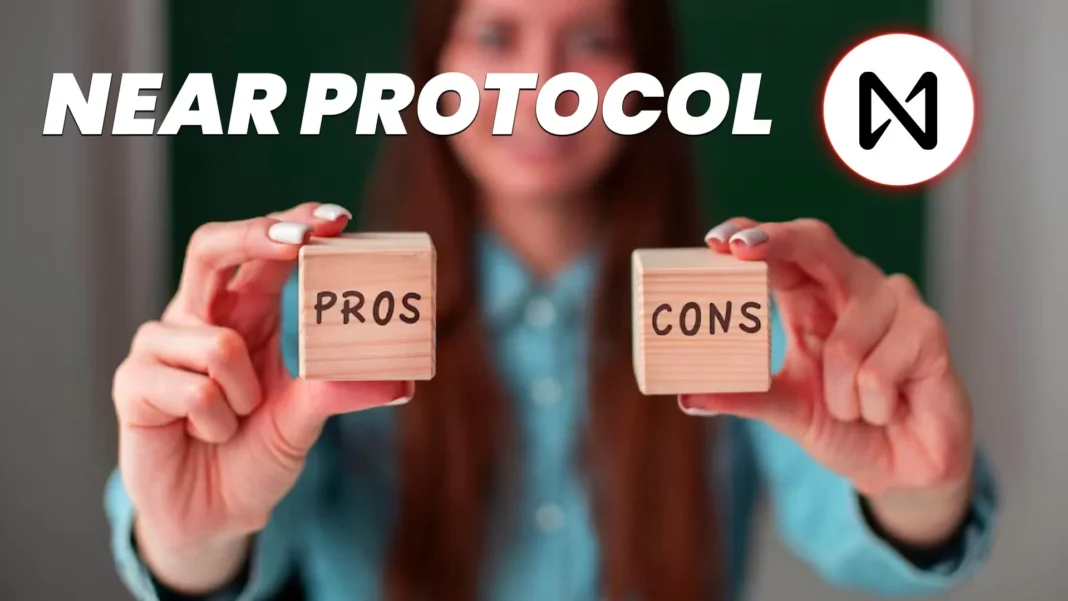- NEAR Protocol uses Nightshade sharding to handle 100,000 transactions per second
- NEAR Protocol has a thriving ecology, with numerous projects, programmers
NEAR Protocol is a layer one delegated proof-of-stake blockchain that aims to build a useable, scalable, and open environment for all of society. It is created as a community-run cloud computing platform to address the issues that afflict the majority of blockchains, including slow transaction speeds, blockchain bloat, poor interoperability, inaccessible interfaces, and low throughput.
According to the company’s documentation, NEAR Protocol uses a sort of sharding called Nightshade, which can handle 100,000 transactions per second (tps). If NEAR Protocol’s technology can deliver over the long term, it might be a game-changer when compared to Ethereum 1.0, which can only handle 15tps, and blockchains like Bitcoin, which can only process 5tps-7tps.
Pros Of Near Protocol
- Scalability
The Near Protocol makes use of the novel sharding technique known as Nightshade, which enables the network to carry out transactions concurrently. With this method, Near Protocol can manage a large number of transactions per second (TPS), which makes it suited for high-demand apps and big-scale dApps.
- Low Transaction Fees
Compared to other well-known blockchain systems like Ethereum, Near Protocol uses a fee mechanism that tries to keep transaction costs down. The protocol’s design guarantees that users can carry out transactions and engage with dApps without paying high costs, which improves the platform’s usability.
- Friendly to Developers
Near Protocol offers a stable and adaptable framework for the development and deployment of dApps. Because it supports other programming languages, including Rust, AssemblyScript, and TypeScript, a larger developer community can use it. Near Protocol also makes it simpler for developers to build on the platform by providing comprehensive documentation, development tools, and an intuitive interface.
- Partnerships and ecology
Near Protocol has developed a thriving ecology, with numerous projects, programmers, and community members actively assisting in its expansion. With groups like Open Web Collective, Gitcoin, and the Ethereum Foundation, it has forged important alliances. These partnerships support innovation, contribute resources, and strengthen the overall network impact, all of which can be advantageous for the protocol’s long-term development.
- Strong Governance Model
Proof of Stake (PoS), a consensus method used by Near Protocol, enables token holders to take part in network governance. Token owners can influence decision-making procedures, protocol updates, and resource allocation through staking and voting. Decentralization and community involvement are encouraged by this democratic governance style, which is ideal for a long-lasting blockchain ecosystem.
Near Protocol’s Drawbacks
- Early Stage Risks
Although it is demonstrating promise, Near Protocol is still a young blockchain platform when compared to older ones like Ethereum. Investing in a developing technology has inherent risks, such as potential technical flaws, ambiguous regulatory situations, and adoption difficulties. When investing in a new blockchain project, it’s critical to take into account the risk-reward trade-off.
- Competition
Many platforms are competing for market share in the fiercely competitive blockchain space. Other smart contract platforms like Ethereum, Polkadot, and Binance Smart Chain compete with Near Protocol. Even though Near Protocol has several distinctive features and benefits, it must constantly innovate and showcase its value to stand out from the competition and draw in developers, customers, and investors.
- Dependence on Ecosystem Development
The development of Near Protocol’s environment has a direct impact on the project’s success. Although the platform has made headway in luring applications and developers, the ecosystem’s durability and scalability are crucial for long-term success. The ecosystem’s value and potential returns on investment may be impacted if it fails to develop and draw widespread usage.
- Regulatory Landscape
The regulatory environment in which Near Protocol operates is rapidly changing, as is true of many blockchain projects. Regulation alterations or unfavorable regulatory rulings may affect the project’s environment and operations. Investors in Near Protocol should think about the potential regulatory risks involved with doing so and keep up with any changes in the law in the relevant jurisdictions.
- Market volatility
Investments in cryptocurrencies and blockchain technology are notoriously volatile. The value of investments may be impacted by the price fluctuations of NEAR, the native token of the Near Protocol. Investors should assess their risk tolerance and be ready for price volatility.
Conclusion
The NEAR Protocol has a promising future with great expectations, an ambitious offering, and the potential to challenge Ethereum.
The NEAR technology’s viability in the face of rising demand and the public acceptance of crypto remains to be seen, though, given how unpredictable and unreliable the cryptocurrency market is right now. The coin will be impacted if regulation negatively affects cryptocurrencies or if macroeconomic factors cause a decline in the prices of all cryptocurrencies, regardless of their purported utility.


